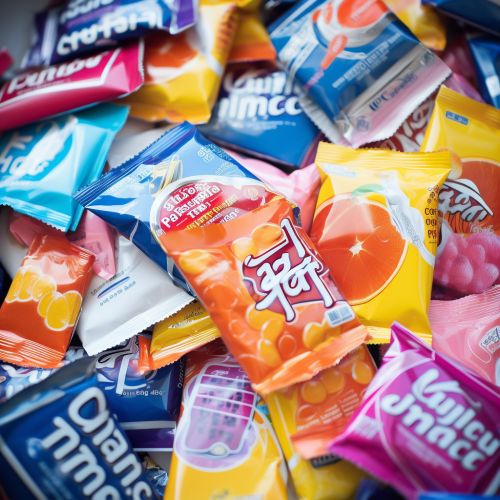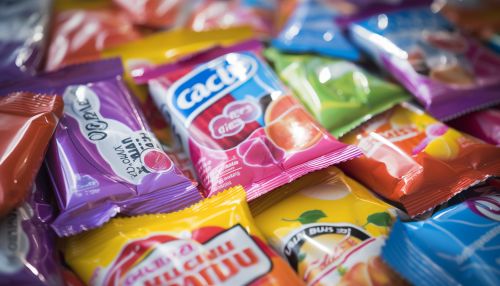Sugar substitutes
Overview
Sugar substitutes are sweeteners that are used in place of regular table sugar (sucrose). They are often synthetically produced, but can also be derived from naturally occurring substances. These substitutes are often used in "diet" or "light" foods and beverages to provide sweetness while reducing the amount of calories. They are also used by individuals with diabetes, as they do not raise blood sugar levels like regular sugar doesread more about diabetes.
Types of Sugar Substitutes
There are several types of sugar substitutes, each with their own characteristics and uses. They can be broadly categorized into artificial sweeteners, sugar alcohols, and novel sweeteners.
Artificial Sweeteners
Artificial sweeteners are synthetic sugar substitutes, but may also be derived from naturally occurring substances. They are often referred to as "intense sweeteners" as they are many times sweeter than regular sugar. Some common artificial sweeteners include:
- Aspartame: Aspartame is a low-calorie sweetener that is approximately 200 times sweeter than sugar. It is used in a variety of food and drink products, including diet sodas, cereals, and sugar-free chewing gumread more about aspartame.
- Saccharin: Saccharin is a non-nutritive sweetener that is 300 to 400 times sweeter than sugar. It is often used in diet drinks, chewing gum, and as a tabletop sweetenerread more about saccharin.
- Sucralose: Sucralose is a zero-calorie artificial sweetener, and is approximately 600 times sweeter than sucrose. It is used in a variety of food and drink products, including diet sodas, baking mixes, and as a tabletop sweetenerread more about sucralose.


Sugar Alcohols
Sugar alcohols, also known as polyols, are carbohydrates that occur naturally in certain fruits and vegetables, but can also be manufactured. They are not as sweet as sugar, but they provide fewer calories. Some common sugar alcohols include:
- Sorbitol: Sorbitol is a sugar alcohol that is used as a sweetener in many diet foods, including sugar-free candies, cookies, and chewing gumsread more about sorbitol.
- Xylitol: Xylitol is a sugar alcohol that is as sweet as sugar but provides fewer calories. It is often used in sugar-free chewing gums, mints, and oral care products as it may help prevent tooth decayread more about xylitol.
- Erythritol: Erythritol is a sugar alcohol that is almost as sweet as sugar but provides fewer calories. It is often used in sugar-free and low-sugar foodsread more about erythritol.
Novel Sweeteners
Novel sweeteners are a category of sweeteners that do not fit neatly into the other categories. They include:
- Stevia: Stevia is a zero-calorie sweetener derived from the leaves of the Stevia rebaudiana plant. It is approximately 200 to 400 times sweeter than sugarread more about stevia.
- Tagatose: Tagatose is a low-calorie sweetener that is 92% as sweet as sugar. It is derived from lactose, which is the sugar found in milkread more about tagatose.
- Trehalose: Trehalose is a sugar that is found in a wide variety of organisms. It is used as a food additive due to its unique properties, such as its ability to help preserve the structure of food during freezingread more about trehalose.
Health Effects
The health effects of sugar substitutes are a topic of ongoing research. While they can help with weight management and blood sugar control, there are also concerns about their long-term health effects.
Benefits
Sugar substitutes provide several benefits:
- Weight Management: Sugar substitutes are low in calories or calorie-free, so they can help individuals manage their weight by reducing their overall calorie intake.
- Blood Sugar Control: Unlike regular sugar, sugar substitutes do not contribute to blood sugar levels, making them a good option for people with diabetes.
- Dental Health: Unlike sugar, sugar substitutes do not contribute to tooth decay and cavities.
Concerns
Despite their benefits, there are also concerns about the use of sugar substitutes:
- Overconsumption of Foods Containing Sugar Substitutes: Some people may eat more of foods containing sugar substitutes because they believe these foods are healthier or can help with weight loss. However, overconsumption of these foods can still lead to weight gain.
- Potential Health Risks: Some research suggests potential health risks associated with the consumption of certain sugar substitutes. For example, there have been concerns about a potential link between aspartame and cancer, but the evidence is inconclusive and more research is neededread more about cancer.
Regulation
In the United States, the Food and Drug Administration (FDA) regulates the use of sugar substitutes. Before a new sugar substitute can be sold on the market, it must be reviewed and approved by the FDA. The FDA evaluates the safety of the sugar substitute based on a review of the scientific research.
